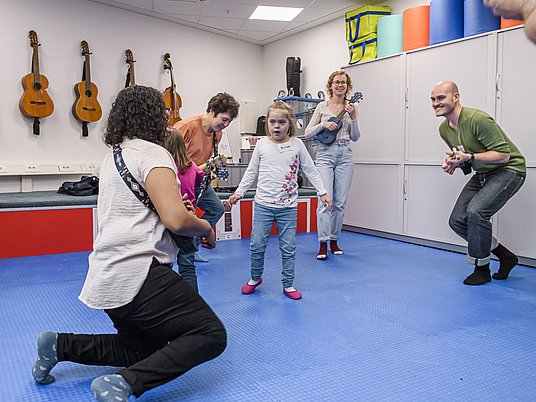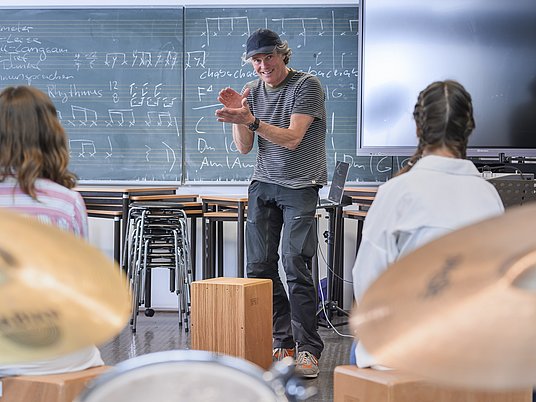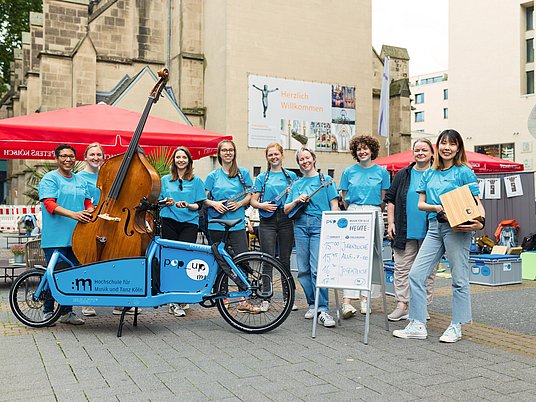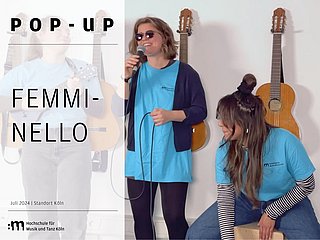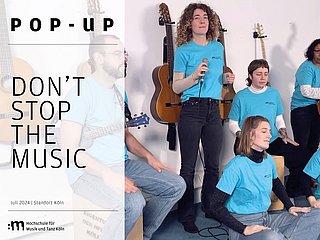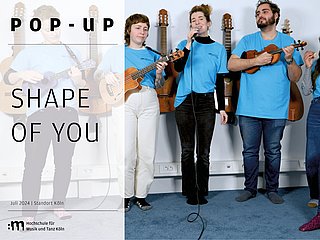Bachelor of Music -
Elementary Music
Artistically diverse - methodically targeted
The Elementary Music Pedagogy (EMP) degree programme offers you the opportunity to express yourself artistically in a variety of ways on different instruments, with the voice and in movement, on the one hand, and to explore the aims, content and methods of making music with different age groups, on the other. At the HfMT Cologne, EMP students receive 90 minutes of main subject lessons per week. This gives them the opportunity to develop themselves as musicians or musical personalities at the highest level and to use this as a basis for their artistic and pedagogical work. The aim is to achieve a balance between executive (technical, reproducing) and creative (creative, formative) activities. The degree in EMP qualifies you for an interesting, varied profession with increasing demand at music schools as well as non-school institutions where musical education is offered for children, young people and adults. By choosing profiles, you can set your own focus according to your individual interests. At both locations, you have the opportunity to deepen the area of instrumental or vocal pedagogy in a profile, or to develop your own profile from the university's overall offer. Information on further profiles can be found below under the headings Profile Cologne or Profile Wuppertal.
If you have any questions about the degree programme, please contact: Prof. Dr. Claudia Meyer Prof. Sarah Semke
Basic information
| Degree | Bachelor of Music |
|---|---|
| Period of study | 8 Semester |
| Course begin | Wintersemester |
| ECTS points | 240 Credits |
| Major subjects | Bağlama, Blockflöte, Cembalo, Fagott, Gesang, Gitarre, Harfe, Horn, Klarinette, Klavier, Kontrabass, Laute, Mandoline, Oboe, Orgel, Posaune, Querflöte, Saxophon, Trompete, Tuba, Viola, Viola de Gamba, Violine, Violoncello |
Additional information
Possible majors: EMP can be studied at both the Cologne and Wuppertal campuses.
- Bağlama, voice, horn, trumpet, trombone, bassoon, clarinet, oboe, flute, violin, viola, violoncello, double bass, piano, guitar
Cologne:
- Tuba, saxophone, harpsichord, organ, harp, lute, LIP (song accompaniment, improvisation, score playing), viola da gamba, jazz/pop (for possible majors, see jazz/pop degree course)
Wuppertal
- Mandolin
Application and aptitude test
Applications are submitted online via the muvac platform. All information on the procedure can be found on our application page.
Admission requirements
- General university entrance qualification or a comparable university entrance qualification
- Proof of a TestDaF 3 language certificate for non-German-speaking applicants
- Successfully passed aptitude test
Qualifying examination
The aptitude test consists of the following three parts:
- Artistic-practical examination in the instrumental or vocal main subject (duration: max. 15 minutes)
- Artistic-pedagogical examination: This lasts approximately 75 minutes, plus 30 minutes preparation time, and consists of the following parts:
- Group improvisation
- Movement design
- Developing/instructing a body percussion, speaking/singing one's own lyrics
- Percussion
- Discussion about the examination process as well as study and career interests
- Music theory examination: ear training (written) and elementary theory of movement (written), total duration: 90 minutes
Detailed information can be found in the aptitude test regulations in the appendix, in particular on the structure and conduct of the aptitude test. After registering for the qualifying examination, you will be activated for a page containing practical examples and tutorials for the second part of the examination (artistic-pedagogical examination).
Course of studies and examination regulations
The study program not only offers space to develop a versatile artistic profile, but also provides a sound theoretical foundation and a variety of opportunities for application in practice. In pedagogical and specialized didactic seminars, students deal with the goals and contents of EMP. In continuous teaching experiments with people of different age groups (babies and toddlers, early childhood, children of elementary school age, adolescents and adults) we enable our students to perceive and develop themselves as teaching personalities, to test existing didactic concepts, to question them critically and to think them further. Our pedagogical concept includes numerous practical courses in close cooperation with music schools, general education schools and other cultural and social institutions for children, adolescents and adults.
The EMP program is composed of eight modules:
- Core module
- Artistic-practical context
- Education
- Mediation
- Professionalization
- Bachelor thesis/ Interdisciplinary project
- Supplement
- Focus
Profile Cologne
Collegial - Individual - Successful
Collegial
Appreciative cooperation is a matter of course for us, and not only in lessons with different practice groups. This is expressed both in team teaching processes and in the reflection of our own attitudes and prejudices, whether in relation to the relationship between teachers and learners, the examination of different understandings of art and music or a diversity-sensitive attitude.
Individual
Students at the Cologne location can choose from the profiles Music Education / Concert Design, Music Education / Music Education Research, MIK (Music Performance, Improvisation, Composition) as well as Dance in Cultural Education or compile their own profile with an artistic or pedagogical focus from the extensive and diverse range of courses.
All profiles have in common that there are cross-connections with other study programs and/or concert halls on site. For example, the profile Music Education/Concert Design regularly cooperates with the Cologne Philharmonic Orchestra, while the profile Music Education/Music Education Research offers events in which research projects are planned and discussed with Master's students and doctoral candidates. A scientific profile can be deepened at the Cologne location in the subsequent Master of Arts and, if necessary, rounded off with a dissertation on an EMP-specific topic. In the profile MIK, offers can be chosen from various courses of study in the fields of performance, improvisation and composition. In the profile Dance in Cultural Education, there are regular collaborations with concert halls and festivals that result in public performances, including the music festival "Acht Brücken - Musik für Köln". Offers from the field of dance are also opened up for this profile.
Successful
Projects and ideas from students are professionally supported. In recent years, Cologne EMP students have been successful several times in the university competition for music pedagogy and have been awarded other prizes (Sigrid Abel Struth Prize, International Music Pedagogy Competition). In addition, EMP graduates are successfully working in music schools as well as in daycare centers, concert halls, music academies and in other professional fields.
Profile Wuppertal
At the Wuppertal location you can choose the profiles Music Education / Cooperative Projects, Ensemble Conducting and Music Education / Music Theater / Musical. In addition, you can choose from courses offered at the Profil Individuale location and EMPRI (Elementary Music Pedagogy at the Primary Level), a cooperation with the Music Department at the Begrische Universität Wuppertal.
IGP/EMP Office
The IGP/EMP Office has been in existence since the summer semester of 2016 and is currently made up of four student assistants from Department 5. The tasks of the IGP/EMP office include answering questions (e.g. about the study plan, module manuals and examination regulations, etc.) about the study programs Instrumental Pedagogy, Voice Pedagogy and Elementary Music Pedagogy as well as the Instrumental and Voice Pedagogy profile.
In addition, the student assistants are trained to pass on information on subject didactics, registration for module examinations (teaching samples and colloquium) and on all required internships and the supplementary internship reports. Students may also contact the IGP/EMP team with questions regarding the content of the module examination colloquium and the Bachelor's thesis. The IGP/EMP office acts as a communication hub between the IGP and EMP program directors, university lecturers, mentors and students. The IGP/EMP team is available during weekly office hours for personal or telephone inquiries and can be reached by mail.
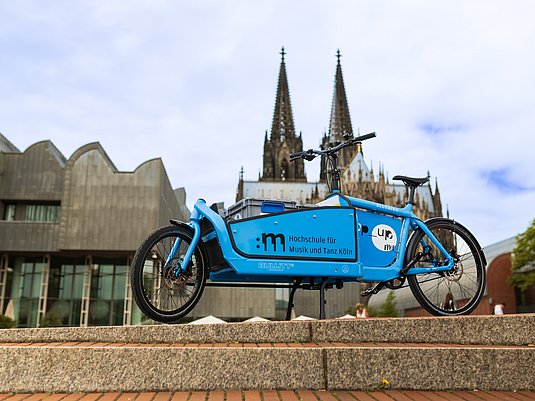
What is it?
Pop-Up means that we are mobile with our cargo bike and trailer and suddenly "pop up" in different places. With Pop-Up-EMP we invite all people to discover and activate their musical resources with us. Music is part of being human. However, the musical activity of children and young people in Germany still depends strongly on the education and income of the parental home. With Pop-Up-EMP we would like to make a contribution to educational justice. With the help of our electric cargo trailer for bicycles we are flexible and mobile and at the same time contribute to the reduction of CO2. For more information, please visit the Pop-Up-EMP homepage.
You can find more videos on our YouTube channel.
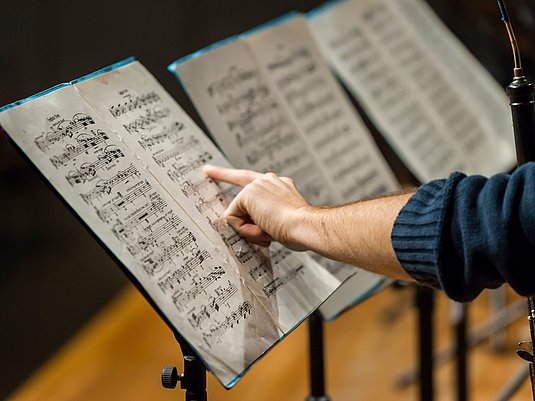
Contact
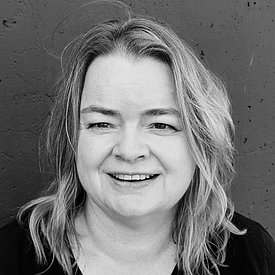
|
claudia.meyer@hfmt-koeln.de |
|
| Telephone |
+49 / (0)221 / 28380 - 117 |
| Address |
Hochschule für Musik und Tanz Köln Theodor-Heuss-Ring 14 50668 Köln |
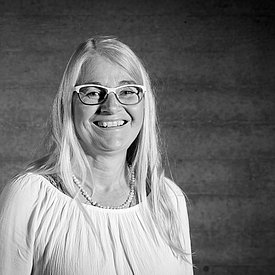
|
sarah.semke@hfmt-koeln.de |
|
| Address |
Hochschule für Musik und Tanz Köln Sedanstraße 15 42275 Wuppertal |
